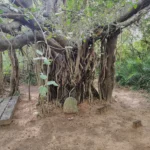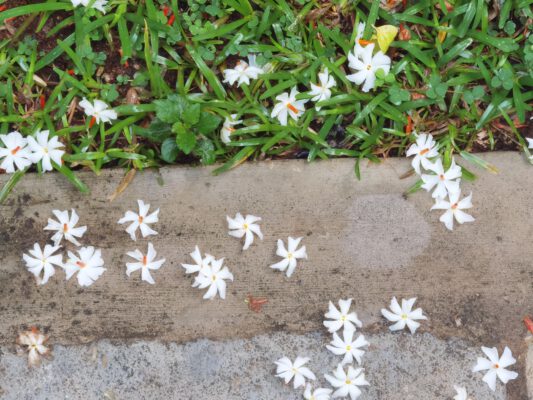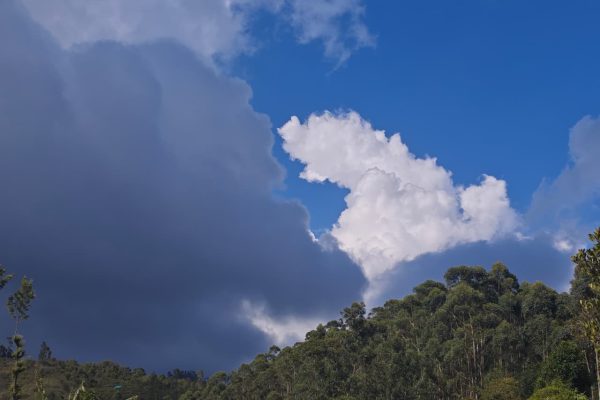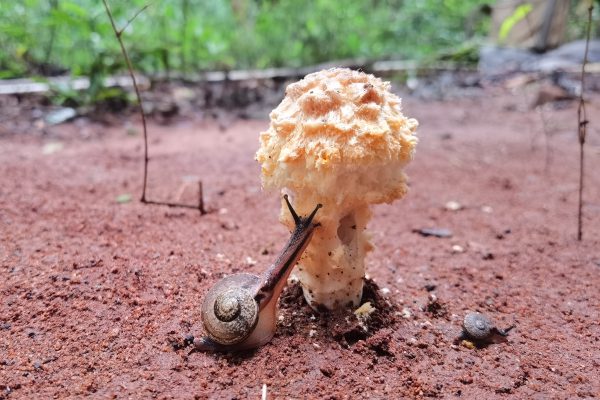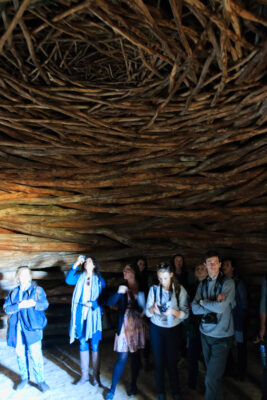Ramana, one of India's great enlightened beings, lived in Tiruvannamalai. At the center of his teachings is the concept of the self: its emptiness and immeasurable vastness at the same time. His teachings are simple, he does not follow a long tradition of interpretations. He was a simple man who meditated on the mountain and held satsangs. As a contemporary of Aurobindo, people listened to both and compared their radically different approaches.
I am currently in Tiruvannamalai. I have attended a few satsangs. I had a question in my mind: how does the true self relate to another true self, especially when it comes to romantic love? I am sitting in an apartment overlooking the mountain. Yesterday, after a little argument, I was sitting on the terrace in the morning when a monkey came and touched me very gently and looked into my eyes as if to tell me that everything was going to be okay. Then he sat down next to me and looked at the mountain. He folded his hands on his knees in a deep, contemplative posture and it felt like an old friend had come to give me comfort.
What we call the self is not what we normally understand it to be. It is not our ego, our personality, our identity or even our soul. The self is the focus of our attention, it is a point in the infinite consciousness of the universe that enables self-realization. It is nothing more than that, and that is precisely why it is everything. The self is the point in the vastness that offers perspective; in deep meditation it can dissolve with universal consciousness, return to its source and cease to exist in full self-awareness.
Being in love
I realized this for the first time as a teenager on the hill in Rome. I was in love, I had an unfulfilled longing. A friendship that was deep, tender and intimate, but never physical, we were not a couple. And while I sat on the mountain and thought about the world, I saw it from within myself. I got to that deepest level of our existence, and even now, 40 years later, I can instantly return to that awareness whenever I remember it. I was both blissful and shocked at the same time. Do I really have the whole world inside me? Do I really not exist? How can it be that everyone talks about themselves without realizing that the self as they see it does not exist? I have carried this realization with me ever since. I've deepened the understanding, put it into context, thought about it. But in the end, not much has changed. It was just there, pure and simple.
I believe that an unfulfilled longing is a good teacher. I become aware of my desire and the impossibility of satisfying it. Desire creates suffering. Why am I not seen the way I want to be seen? Why is the love I feel not reciprocated? Why don't I share what I really feel? This last question is perhaps the most important. Other desires are about attachment, about wanting or being, but unfulfilled love is about being seen.
How can a self see another self? And do they have to see each other to love each other? Is there a deeper unity within cosmic consciousness where two can unite to become something else? What is this transformation?
The self, as a point of consciousness within universal consciousness, becomes aware of its soul when it awakens. The soul, however, is even more difficult to understand. It is that which is born and reborn. The soul comes with biological birth, it enters my body and stays there. It leaves my body when it breaks up. It was there before I was born and will still be there after I die. It is a manifestation of the universal soul, Purusha. The soul is what we really are, not the physical body, not the self. The soul is the core of our existence. Finding our soul is the most difficult path we can take. Only when we find our soul can we truly love; we can find our soulmate.
Soul
Every soul is different. That is the beauty of it. The soul is not my ego, not my personality and identity. The soul holds life in my body, it flows through every nerve, every fiber, every bloodstream, every nerve cell, every hair and every taste bud. The soul holds my experiences together, plays with my memory, delights in my existence. As a by-product, it creates the ego, my personality and identity. But all this can change, I can change. The soul does not change. It flows through time as part of the universal consciousness, it could be related to the concept of time itself. Self-consciousness is not bound to time and space. In a deep state of being, I can live 1000 years, I can connect with my soul and realize that it is immortal. And when the self and the soul join hands and fly, we can experience something that cannot be described by science. It is Shiva and Shakti, the universal interplay between self and manifestation. The only problem is our ego and our mind. We need them to find nourishment and to live with others, but they stand in the way of true self-realization.
Because we have a soul, we can love. The yogis, sadhus and siddhars may focus on self-realization. But to love, we go through the self into the soul and find another soul. These two souls are not the same, they fight and unite, they enjoy and suffer, they dance.
While the self has little to do with my biography, the soul shows itself through my biography. It is always there, whether I am aware of it or not. Seeing this core of my own biography is the path to realization. For me, this path was the search. I am a wandering soul. My path has always been a spiritual search, my strength a deep healing.
